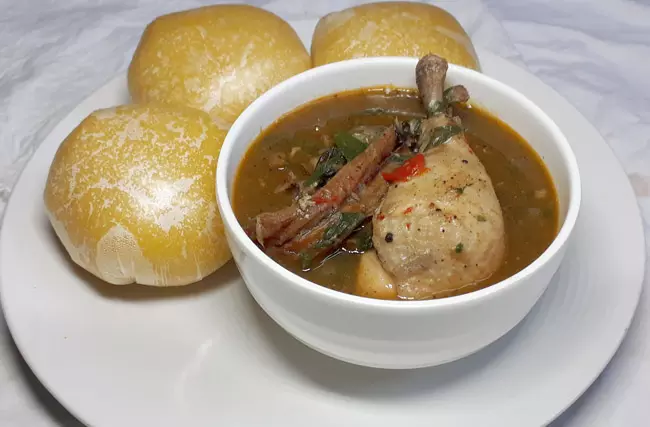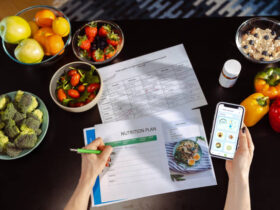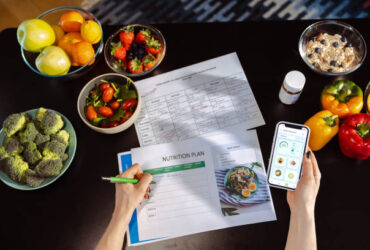A Delightful Journey into Ofe Nsala: A Traditional Nigerian Soup
Ofe Nsala, also known as white soup, is a culinary treasure from Nigeria. This year alone, it has become a mainstay in my diet, surpassing even my previous favorite.
Within Igbo land, ofe nsala holds a special place as a cherished delicacy. While I adore the vast array of Nigerian cuisine, some dishes resonate with me more deeply. (For instance, melon soup (ofe egusi) will always hold a top spot in my heart.
Its versatility allows it to blend beautifully with many other Nigerian soups, including ofe nsala. Sometimes, I even create a delightful combination of the two!)
One unique aspect of ofe nsala is its lack of palm oil, setting it apart from soups like pepper soup and ewedu soup. This delicious dish can be prepared with either plain beef or a medley of meats. In my rendition, I opted for chicken.
Ofe Nsala reigns supreme in the southern and eastern regions of Nigeria, particularly among the Efik and Igbo people.
These communities are not only known for their masterful preparation of this dish, but also for their fervent enjoyment of it.
So, if you find yourself partnered with someone from these areas, consider surprising them with a comforting meal of pounded yam and ofe nsala tonight.
To embark on this culinary adventure, here’s what you’ll need:

Ingredients (serves approximately 12):
- Preparation time: 80 minutes
- Yam (6-8 medium pieces)
- Ground crayfish (1 cup)
- 3 seasoning cubes
- 1 teaspoon Uziza seeds
- 1 cup chopped Uziza leaves
- Dried or smoked fish (2 medium pieces)
- Snails (Optional)
- 1.3KG / 3lb Chicken
- Small quantity of Dawadawa
- Handful of chopped Utazi leaves
- Salt and Pepper to taste
Crafting the Ofe Nsala
- Preparing the Thickener: Begin by peeling and boiling the yam. Once cooked, traditionally it would be pounded with a mortar and pestle. This pounded yam serves as the base for thickening the ofe nsala.
- Flavorful Blend: Combine the crayfish, uziza seeds, and dawadawa in a grinder to create a flavorful powder. Wash and chop the uziza leaves for later use.
- Cleaning the Snails (Optional): For those using snails, you can wash them with lemon juice to remove the slimy film. Interestingly, some Nigerian recipes incorporate snails with the slime intact, even keeping the shells on! (A prime example is the mouthwatering Ijaw dish, Keke Fieye.)
- Parboiling the Chicken: Parboil the chicken with the necessary seasonings: 2 stock cubes, salt (1 teaspoon), half a cup of sliced onions, and half a teaspoon of ginger or garlic. (You can even follow along with a video demonstration!)
Building the Broth
- In this version, I used chicken. However, feel free to substitute with a combination of assorted cuts of beef.
- Parboil the chosen meat for roughly 7 minutes, until tender enough to eat. Then, add the hot-water-washed dried fish. (If using a stronger dried fish like mangala, you can incorporate it earlier.)
- Pour in approximately 3 cups of water, either cold or boiled.
The amount of water required can vary depending on the thickener used and the number of people you’re preparing for.
- Continue boiling the mixture for another 7-10 minutes, ensuring both the meat and fish are fully cooked. Now, add the ground crayfish/uziza seed/dawadawa mixture, along with ground red pepper. Remember to taste the pepper before adding it, as the uziza seeds already pack a punch.

Bringing it All Together
- Take a moment to assess the flavor of your soup. If needed, add a seasoning cube or some salt to enhance the taste.
- Gently incorporate the pounded yam.
Adjusting the Consistency
- You can add half of the pounded yam initially and observe the soup’s consistency for the next five minutes. If it requires further thickening, add the remaining yam bit by bit. It’s important to find a consistency that suits your preference. I favor a lighter ofe nsala, as I find it more enjoyable in terms of taste.
The Final Touches
- Once you’ve achieved the desired thickness and the pounded yam is well-dissolved, add the chopped uziza and utazi leaves. Utazi leaves are used sparingly in white soup to introduce a subtle hint of bitterness.

Serving Up Delight
Allow the soup to simmer for a few minutes before serving this delectable ofe nsala with pounded yam, fufu, or eba. Enjoy this heartwarming and flavorful journey into Nigerian cuisine!
Video For Nsala Soup (white soup)
Here is a simple video for making the popular white soup, although we are gonna come out with a better video soon. This would give you a clue as to what the soup really looks like.
I would like to see your comment below, do you like this delicious Nigerian soup?
| Nsala Soup Recipe (White Soup) | Igbo People Foods Nsala soup, also know as white soup is a popular soup in Igboland. Igbo is a popular Nigerian ethnic group. This soups is also loved by the Efiks and Ijaws in South-South Nigeria. PREP TIME25 mins | COOK TIME1 hr 5 mins |TOTAL TIME1 hr 30 mins COURSE: Main Course CUISINE: Igbo Recipe, Nigerian Cuisines SERVINGS: 12 People. | CALORIES: 470 kcal. |EQUIPMENT: Pots INGREDIENTS: 1 KG Pounded Yam 1 cup crayfish 3 seasoning cubes 1 teaspoon Uziza seeds 1 cup sliced uziza leaves 200 g Dried fish 8 Giant Snails Optional 1.3 KG Chicken Small dawadawa Sliced utazi leaves Salt to taste. 2 scotch bonnet peppers INSTRUCTIONS Peel and boil some yam, then pound and set aside. You need about 1KG of pounded yam. Combine crayfish, uziza seeds, dawadawa and blend to a powder. Prepare all the other ingredients (slice the leaves, wash the snails using lime or orange juice) Season the chicken with 2 stock/seasoning cubes, teaspoon each of ginger and garlic, teaspoon of salt and allow to boil then add the washed fish. Add about 3 cups of water. Bring to boil, you want the meat and fish soft and easy to chew. Then add the crayfish, uziza seed blend. The pepper should be followed after tasting. You can taste your soup. You can add an extra seasoning cube or more salt to taste Introduce the pounded yam in small portions. Let it dissolve and thicken. Then the leaves should come in. Let it simmer on low heat for few minutes and you are done. |















Leave a Reply